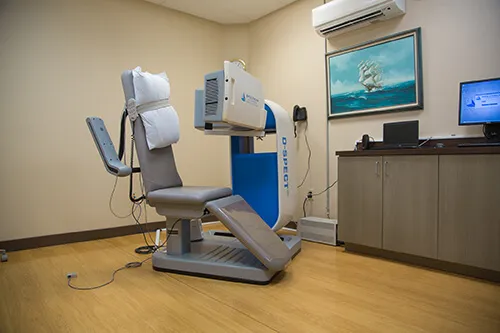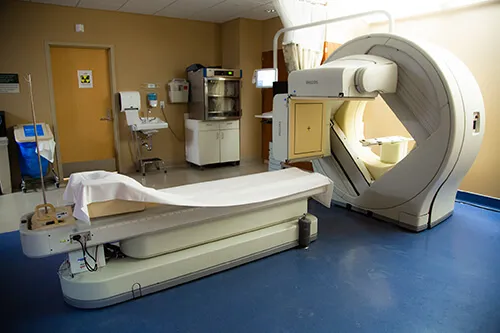Nuclear Medicine
Nuclear Medicine is one of several imaging modalities of Radiology. Nuclear Medicine uses Radiopharmaceuticals or Radioactive tracers to evaluate the systems of your body. That is what makes Nuclear Medicine different from the other branches of Medical Imaging; the strength of Nuclear Medicine lies in its ability to demonstrate function rather than just anatomy. The radiopharmaceuticals are designed to mimic naturally occurring molecules in your body; therefore there are no side effects from the tracers with which you are injected. Although Nuclear Medicine does use a small amount of Ionizing radiation, the primary isotope used has a half life of only 6 hours, making it safe to be around others after being injected.
Does the nuclear medicine gamma camera make noise like an MRI? Will I be going into a tube?
No, there is no noise from the Nuclear Medicine cameras. There may be a small amount of noise associated with the movement of the camera, but the camera does not emit sounds to acquire images like MRI and CT scanners. You will not be in a tube, but rather under the camera that is supported by a ring like structure, please refer to images of camera.
Can I bring my belongings with me into the nuclear medicine room?
Yes you will be able to being them into the room, but depending on the exam your doctor has ordered you may be asked to empty your pockets of metal objects for the duration of the exam.
Who will perform my nuclear medicine exam?
A certified and licensed Nuclear Medicine technologist (CNMT) will be helping you. In addition our technologists are trained to start IV catheters, perform CPR and are required to have ongoing continued education to keep their skills sharp.
Who will read my nuclear medicine test?
Your Nuclear Medicine exam will be read by a board certified Radiologist with extensive training.
How is this radiopharmaceutical administered?
In most cases the Radiopharmaceutical is injected intravenously, but it can also be given orally, or inhaled.
Can I eat and drink prior to my nuclear medicine exam?
This varies by exam. For more detailed information regarding the prep of your exam, please call the scheduling department at (775) 445-5500.
Can I have a copy of my images to take home with me?
Yes you can. We will have you sign a release form prior to giving you a copy and it takes about 24 hours for the written report to be ready.





